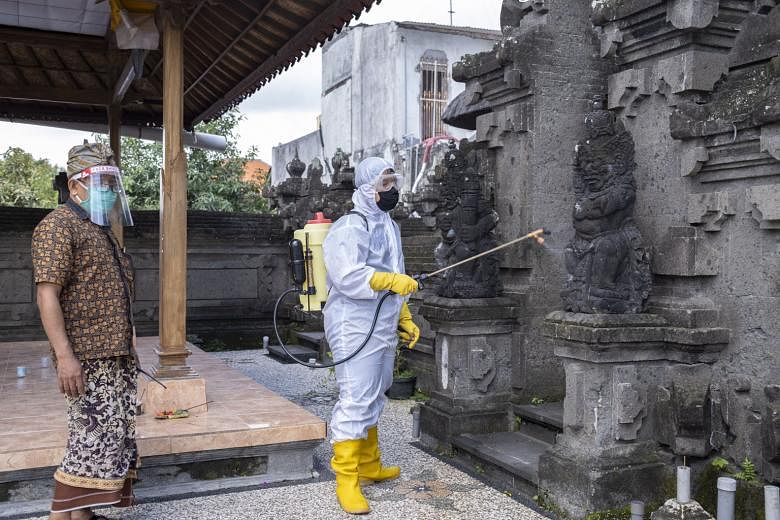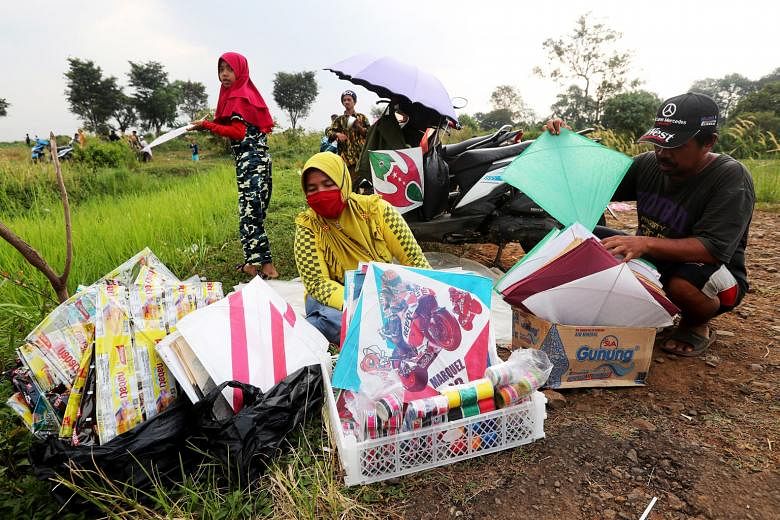After about three months of holding virtual meetings with officials across the country, Indonesian President Joko Widodo will resume his working trips next week.
The country is transitioning into a "new normal" with the easing of restrictive measures despite soaring infections. As of yesterday, Indonesia recorded a total of 42,762 cases of infections and 2,339 deaths, which is the highest number of fatalities from the coronavirus in South-east Asia.
Earlier yesterday, the President - popularly known as Jokowi - was scheduled to visit Central Java but the plan was cancelled due to a limited Cabinet meeting, said Presidential Secretariat chief Budi Hartono, who added that Mr Joko is set to begin his trips next week.
The world's fourth-most populous nation of about 270 million people reported 1,331 new coronavirus cases yesterday, an all-time high in a single day.
The figures for new cases had hovered around 1,000 daily for last week and the past three days, compared with several hundreds in the previous weeks.
Epidemiologists have warned the trend will continue in the coming weeks as testing and contact tracing intensify.
Jakarta had eased its restrictive measures gradually since June 4.
Places of worship reopened on June 5; workplaces, restaurants and standalone retail shops on June 8; and markets and malls on Monday.
The reopenings had to be carried out with strict health guidelines, such as operating at 50 per cent capacity and ensuring people keep a 1m distance from one another.
Other cities such as Surabaya, and regions across the archipelago of more than 17,000 islands, have also relaxed their restrictions.
The Transport Ministry has allowed all transport modes, including airplanes and trains, to gradually operate at 70 per cent of their capacity.
The easing of restrictive measures, however, has raised concerns after a rise in the number of coronavirus cases in wet markets in the past three weeks.
As of Monday, 573 traders in 110 traditional markets across Indonesia have tested positive for Covid-19, while 32 traders have died, according to the Indonesian Traditional Market Traders Association as reported by Kompas.
Of the latest tally, Jakarta recorded 64 cases in nine markets. There were only 214 cases and 19 deaths as of May 29 in markets nationwide.
In Surabaya, the authorities temporarily closed 14 mosques and four churches last week after a number of residents in the surrounding areas tested positive.
Indonesia's second-largest city made headlines in late April to early May when 63 workers at a cigarette factory tested positive following the death of another two workers, who worked during their quarantine period while waiting for their test results.
Epidemiologist Windhu Purnomo at Surabaya-based Airlangga University told The Straits Times that before the city entered its transition period into the new normal on June 8, his team predicted the peak of the pandemic would occur in mid-June.
Around 20 per cent of the city's three million inhabitants would be infected by the virus in the first wave, including those undetected, he added.
"When no extension of the large-scale social restrictions was announced, there was euphoria among the residents. They felt free and thought it's all right now," he said, warning that the peak will be higher than the previous estimate, while the second wave may come in mid-July.
Other parts of the country with relatively lower number of cases such as tourist favourite Bali, which reported 895 cases in total, hope to benefit from the new normal.
Mr I Ketut Ardana, chairman of the Bali chapter of the Indonesian Tour and Travel Agency Association, said the collapse of the tourism industry has led to many workers being laid off or unpaid.
"Hopefully, the curve (of infections) declines soon so that Bali is more confident about reopening in August," he told ST, citing the announcement that the island will reopen to domestic visitors in August and international tourists in September.
However, Mr Jodi Mahardi, spokesman for the Coordinating Ministry for Maritime Affairs and Investment who is also in charge of tourism, among other areas, said yesterday that the August and September plans are tentative and dependent on the national coronavirus task force.
• With additional reporting by Wahyudi Soeriaatmadja












